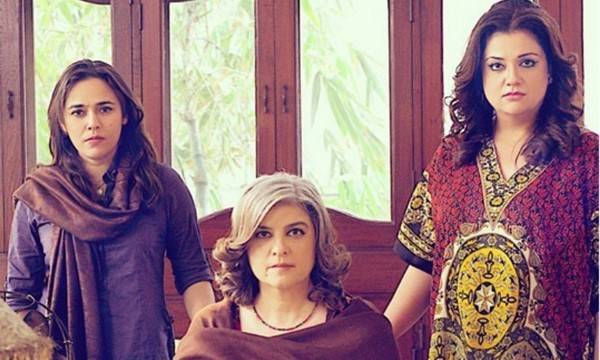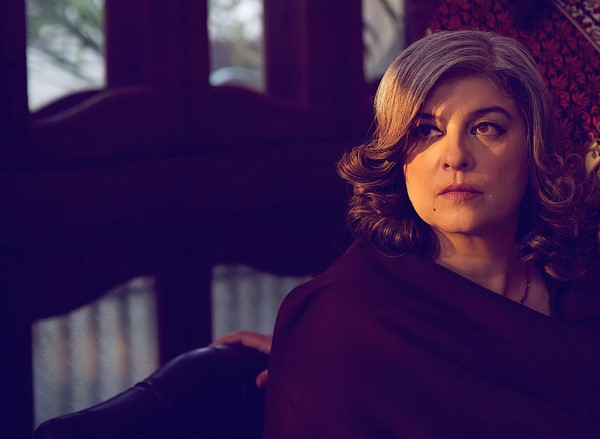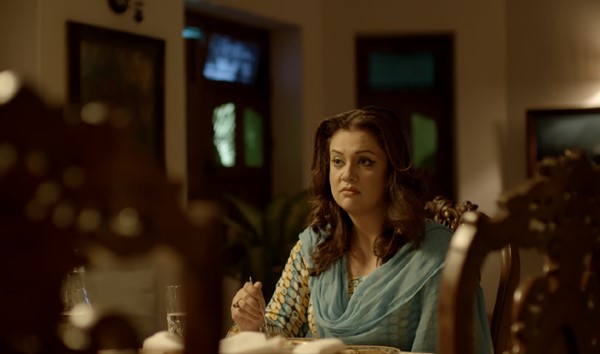
The duo of Mohammed Ahmed and Mehreen Jabbar, formed in the late 1990’s, has a rich history of working together. Mohammed Ahmed has not only presented himself as a performer in Mehreen Jabbar’s popular drama serials such as Doraha, Daam and Mata-e-Jaan, but has also written prolifically for her, examples being some episodes from the series Kahaniyaan, films Ramchand Pakistani and Dil Mera Dharkan Teri (remake), telefilms Ghoonghat and Hum Chal eAaye, and the comedy serial Coke Kahani. Mohammed Ahmed’s simple and relatable stories are presented in a poetic manner by Mehreen Jabbar, making these works attractive for the viewers. In 2016, when six filmmakers from India and six filmmakers from Pakistan collaborated to make films as a part of the Zeal for Unity project, one of the three duos from Pakistan was of Ahmed and Jabbar, who produced the award-winning film, Lala Begum.
The story of Lala Begum revolves around two sisters, Mehr and Sehr, performed by Marina Khan and Sonia Rehman, the former being a woman who is uptight in her rules and regulations to such an extent that she does not even agree to a frank conversation with her own sister, no matter how important it may be; and the latter being a rebellious lady, modern in her attire and approach. Mehr lives alone in a dwelling bequeathed to her by her father, Rafeequllah Syed (Shehryar Zaidi), accompanied only by a house-keeper named Akram, performed by Mohammed Ahmed himself. Sehr comes back to her sister after being widowed, and issues from more than a decade ago begin to come up again, resulting in repeated quarrels between the sisters.

The characters have been developed in such a manner that the initial gestures of both the elder and the younger sister are neither made to appeal the viewers, nor demand their sympathies. Mehr’s priggishness about dressing, language and mannerisms becomes suffocating, and Sehr’s rebellion manifests itself in the form of smoking and flirting only.
It is as the story moves forward that the dynamicity and the well-roundedness of characters is revealed. While a soft song in flashback acquaints the viewers with the sisters’ beautiful childhood spent together, the diary of Mehr, also a fine symbol of her tenacity, reveals the causes of her solemnity, and Mehr’s opening up about her matrimonial life explains why she is eager to free herself of all chains and fly.
The tale is a fine example of the binary of appearance and reality. It shows how appearances may not always be a true reflection of a person’s inside, and attitudes, no matter how abominable, can be justified by delving deeper into people’s hearts. The message it seems to convey is that speaking about issues is extremely important and may save a lot of lives from being destroyed, for neither Mehr (Lala Begum) objects to the restrictions imposed on her, nor does Sehr reveal anything about her days spent away from her sister, resulting in both the women’s lives becoming living hells.

Lala Begum is soft in its presentation, owing to its refined use of Urdu language and the light music by Ustaaz, serene in its aura. A sombre look has been given to the film with ineluctable focus on water-sprinkling dainty fountains, artistically carved furniture and plant-pots galore – making the film a complete work of art.
While Mohammed Ahmed has reverted to Urdu language after many years of focussing on Punjabi characters, Mehreen Jabbar also seems to have made a comeback to her characteristic style of direction involving a fresh camera-look, veteran actors like Marina Khan, Sonia Rehman, Humayun Saeed, Jahan Ara Hai and Mohammed Ahmed, and a conspicuous flawlessness, the kind of which was observable in her serials, Aur Zindagi Badalti Hai, Malal and Vasl. The film has acted as a break from commercialism for both, providing them an opportunity to express their creativity and artistic abilities in the best possible manner. The proofs are the two awards which Lala Begum has won – one for the best screenplay at the South Asian Film Festival held in Washington DC, and the other for the best film at the Pakistan International Film Festival.
The writer is a student of English Language and Literature at GCU, Lahore, and can be reached at m.ali_aquarius85@yahoo.com
The story of Lala Begum revolves around two sisters, Mehr and Sehr, performed by Marina Khan and Sonia Rehman, the former being a woman who is uptight in her rules and regulations to such an extent that she does not even agree to a frank conversation with her own sister, no matter how important it may be; and the latter being a rebellious lady, modern in her attire and approach. Mehr lives alone in a dwelling bequeathed to her by her father, Rafeequllah Syed (Shehryar Zaidi), accompanied only by a house-keeper named Akram, performed by Mohammed Ahmed himself. Sehr comes back to her sister after being widowed, and issues from more than a decade ago begin to come up again, resulting in repeated quarrels between the sisters.

The tale is a fine example of the binary of appearance and reality
The characters have been developed in such a manner that the initial gestures of both the elder and the younger sister are neither made to appeal the viewers, nor demand their sympathies. Mehr’s priggishness about dressing, language and mannerisms becomes suffocating, and Sehr’s rebellion manifests itself in the form of smoking and flirting only.
It is as the story moves forward that the dynamicity and the well-roundedness of characters is revealed. While a soft song in flashback acquaints the viewers with the sisters’ beautiful childhood spent together, the diary of Mehr, also a fine symbol of her tenacity, reveals the causes of her solemnity, and Mehr’s opening up about her matrimonial life explains why she is eager to free herself of all chains and fly.
The tale is a fine example of the binary of appearance and reality. It shows how appearances may not always be a true reflection of a person’s inside, and attitudes, no matter how abominable, can be justified by delving deeper into people’s hearts. The message it seems to convey is that speaking about issues is extremely important and may save a lot of lives from being destroyed, for neither Mehr (Lala Begum) objects to the restrictions imposed on her, nor does Sehr reveal anything about her days spent away from her sister, resulting in both the women’s lives becoming living hells.

Lala Begum is soft in its presentation, owing to its refined use of Urdu language and the light music by Ustaaz, serene in its aura. A sombre look has been given to the film with ineluctable focus on water-sprinkling dainty fountains, artistically carved furniture and plant-pots galore – making the film a complete work of art.
While Mohammed Ahmed has reverted to Urdu language after many years of focussing on Punjabi characters, Mehreen Jabbar also seems to have made a comeback to her characteristic style of direction involving a fresh camera-look, veteran actors like Marina Khan, Sonia Rehman, Humayun Saeed, Jahan Ara Hai and Mohammed Ahmed, and a conspicuous flawlessness, the kind of which was observable in her serials, Aur Zindagi Badalti Hai, Malal and Vasl. The film has acted as a break from commercialism for both, providing them an opportunity to express their creativity and artistic abilities in the best possible manner. The proofs are the two awards which Lala Begum has won – one for the best screenplay at the South Asian Film Festival held in Washington DC, and the other for the best film at the Pakistan International Film Festival.
The writer is a student of English Language and Literature at GCU, Lahore, and can be reached at m.ali_aquarius85@yahoo.com

